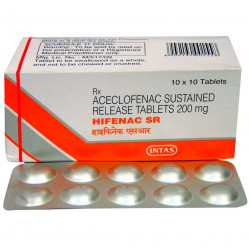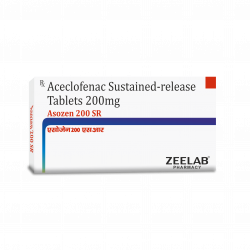Download India's most affordable pharmacy app
- Compare with medicine prices
- Save upto 90% on your medicine bills
COMPOSITION:
Aceclofenac (200mg)DESCRIPTION:
Hifenac SR Tablet contains Aceclofenac (200mg) and is prescribed for the treatment of pain and inflammation associated with musculoskeletal disorders, arthritis, spondylitis, sprains, and post-operative conditions. It is particularly effective in reducing swelling, stiffness, and discomfort, improving mobility, and supporting faster recovery. Aceclofenac is a non-steroidal anti-inflammatory drug (NSAID) that works by blocking the action of cyclo-oxygenase (COX) enzymes, thereby reducing prostaglandin production—substances responsible for pain, swelling, and inflammation. Not everyone taking Hifenac SR Tablet will experience side effects, but some may notice nausea, stomach discomfort, heartburn, dizziness, or skin rashes. These effects are generally mild and improve as the body adjusts. If symptoms persist or worsen, medical consultation is advised. The medicine should be taken exactly as prescribed by a physician, preferably after meals to reduce gastric irritation. Swallow the tablet whole with water; do not crush or chew. Avoid Hifenac SR Tablet if allergic to Aceclofenac or other NSAIDs. Patients with stomach ulcers, bleeding disorders, kidney disease, liver problems, heart disease, or uncontrolled hypertension should inform their doctor before use. Pregnant and breastfeeding women must seek medical advice before starting treatment. Alcohol intake should be limited, as it increases the risk of stomach irritation and bleeding.
Uses of Hifenac SR Tablet
Hifenac SR Tablet is used in the management of pain and inflammation. The detailed uses of Hifenac SR Tablet are as follows:
- Pain and Inflammation Control: Hifenac SR Tablet helps relieve pain, swelling, and stiffness in musculoskeletal and joint disorders.
- Arthritis Relief: Reduces symptoms in osteoarthritis, rheumatoid arthritis, and ankylosing spondylitis.
- Post-Traumatic Recovery: Supports healing after sprains, strains, and sports injuries.
- Post-Operative Pain Management: Helps reduce inflammation and discomfort following surgical procedures.
Benefits of Hifenac SR Tablet
- Provides effective pain and inflammation relief.
- Improves mobility and joint flexibility.
- Speeds recovery in injury and post-surgery cases.
- Reduces reliance on stronger painkillers.
How Hifenac SR Tablet Works
Hifenac SR Tablet contains Aceclofenac (200mg), an NSAID that blocks the COX enzymes involved in the production of prostaglandins—chemicals that cause pain, swelling, and inflammation. By reducing these substances, the medicine alleviates symptoms and improves comfort, enabling better movement and faster recovery.
How to Take Hifenac SR Tablet
- Take exactly as prescribed by your doctor.
- It is best taken after meals to minimize stomach irritation.
- Swallow the tablet whole with water; do not crush or chew.
- Avoid exceeding the recommended dose to prevent side effects.
Side Effects of Hifenac SR Tablet
Common side effects
- Nausea or vomiting
- Stomach discomfort or heartburn
- Dizziness or headache
- Mild skin rashes
Serious side effects
- Stomach bleeding (black stools, vomiting blood)
- Liver issues (yellowing of the skin or eyes, dark urine)
- Severe allergic reactions (swelling, difficulty breathing)
- Kidney problems (changes in urine output, swelling in legs)
Seek medical attention immediately if serious symptoms occur.
Safety Advice
- Alcohol – Avoid alcohol to reduce the risk of stomach irritation and bleeding.
- Pregnancy – Avoid in late pregnancy unless prescribed; it may cause complications.
- Breastfeeding – Use with caution; consult your doctor before use.
- Driving – Avoid driving if you feel dizzy or drowsy.
- Kidney – Use with caution; dose adjustment may be necessary.
- Liver – Monitor liver function during prolonged use; avoid in severe liver disease.
Frequently Asked Questions
Q: Can I take Hifenac SR Tablet on an empty stomach?
A: No, it is best to take Hifenac SR Tablet after meals. Taking it on an empty stomach can increase the risk of acidity, stomach irritation, or ulcers, particularly during long-term use.
Q: Is Hifenac SR Tablet safe for long-term use?
A: Long-term use of Hifenac SR Tablet should only be under strict medical supervision. While it can effectively manage chronic pain, prolonged use may increase risks to the stomach, kidneys, liver, and cardiovascular system.
Q: Can I stop taking Hifenac SR Tablet if I feel better?
A: You should not stop the medicine abruptly without consulting your doctor. Even if symptoms improve, stopping suddenly may allow inflammation to return or cause a flare-up of the condition.
Q: Does Hifenac SR Tablet cause weight gain?
A: Weight gain is not a direct side effect of Hifenac SR Tablet. However, reduced mobility due to pain or injury might lead to weight changes, which can improve as your activity level returns.
Q: What should I do if I miss a dose of Hifenac SR Tablet?
A: Take the missed dose as soon as you remember unless it is close to your next scheduled dose. In that case, skip the missed one—never double the dose to catch up.
Q: Can Hifenac SR Tablet be taken with other painkillers?
A: It should only be combined with other painkillers if approved by your doctor. Using multiple NSAIDs together can increase the risk of stomach ulcers, bleeding, and kidney problems.
Q: Are there any common side effects of Hifenac SR Tablet?
A: Yes, mild effects such as nausea, heartburn, and dizziness may occur, especially initially. These usually improve over time, but persistent or severe symptoms should be evaluated promptly.
Q: Is Hifenac SR Tablet suitable for elderly patients?
A: Yes, but elderly patients require extra caution and regular monitoring due to a higher risk of gastrointestinal bleeding, cardiovascular events, and kidney or liver complications from NSAIDs.
Q: Can Hifenac SR Tablet be taken during pregnancy or breastfeeding?
A: It should only be used if clearly needed and prescribed by a doctor. Avoid in late pregnancy due to risks to the baby, and use with caution during breastfeeding









 Added!
Added!